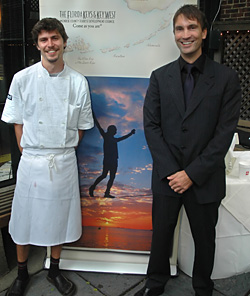Asphalt Over Sand: Priceline.com Finds Labor Day Travelers Are More Attracted To Big Cities Than Beaches
NORWALK, Conn.--(BUSINESS WIRE)--Blame it on the recent rains, the storms, or maybe the sudden temperature dip in some parts of the U.S. Whatever the reason, big cities are out-polling the beaches in priceline.com’s (Nasdaq: PCLN) 5th annual survey of the 50 most-popular destinations for the upcoming Labor Day holiday.
To compile its list of the Top 50 Labor Day travel destinations, priceline.com looked at a sampling of more than 30,000 hotel room booking requests made by priceline.com customers for the September 1-3, 2007 period. Because the survey is based on actual booking requests, and not on consumer preference polls or votes, priceline.com believes its annual survey is one of the more accurate predictors of Labor Day travel trends.
Priceline.com also said it still has plenty of last-minute airline tickets, hotel rooms, rental cars, vacation packages and cruises available for Labor Day getaways. Visit www.priceline.com for full details.
Chicago was the big winner in the Labor Day 2007 survey, with the Millennium Park and North Michigan Avenue areas coming in #1 and #2 in popularity. New York City followed up with the next 4 spots on the list for its Upper Midtown, Midtown East, Soho and Midtown West neighborhoods. Las Vegas and San Francisco neighborhoods rounded out the top 10 spots on the list.
Beach areas weren’t totally shut out on the list. San Diego took six spots on the list, the highest total of any individual city, while other areas making the list included Waikiki, Key West, Virginia Beach, Hilton Head and San Juan. For most Americans, Labor Day is a long weekend, so almost no overseas international destinations made the list, with the exception of London.
Destinations recording the biggest gains in popularity over 2006 include Jersey City (+20 spots to #23), St. Louis (+19 spots to #12), New York’s Midtown South area (+19 spots to #30) and San Diego’s East County (+14 spots to #18).
Priceline's Top 50 Destinations for Labor Day 2007
Rank 2007 Neighborhood Rank 2006 Yr/Yr Change
1 Chicago, Millennium Park, 2 +1
Loop & Grant Park Area
2 Chicago, North Michigan Ave/ 4 +2
River North Area
3 NYC, Upper Midtown/Central Park South 1 -2
4 NYC, Midtown East 7 +3
5 NYC, Downtown/Soho/Financial District 5 0
6 NYC, Midtown West 6 0
7 Las Vegas, Strip Vicinity South NA NA
8 Las Vegas, Strip Vicinity 3 -5
9 San Francisco, Union Square West 12 +3
10 San Francisco, Union Square East, 11 +1
Embarcadero
11 San Diego, Coastal Area 8 -3
12 St. Louis, Downtown 31 +19
13 Boston, Copley Area 15 +2
14 Seattle, Downtown 9 -5
15 San Diego, Downtown & Harbor Island 13 -2
16 Vancouver 14 -2
17 Boston, Downtown/Charlestown 16 -1
18 San Diego, East County 32 +14
19 San Diego, Point Loma/Shelter Island/ 21 +2
Old Town
20 St. Catharines, Niagara Falls 19 -1
21 Montreal 22 +1
22 San Antonio, Downtown/Riverwalk 17 -5
23 Jersey City 43 +20
24 Las Vegas, Strip Vicinity North NA NA
25 Chicago, O'Hare Airport Vicinity 23 -2
26 Oahu, Waikiki Beach Area NA NA
27 Beverly Hills/West Hollywood NA NA
28 Philadelphia, Downtown 34 +6
29 Las Vegas, Convention Center/UNLV 18 -11
30 NYC, Midtown South 49 +19
31 Hollywood NA NA
32 Orange County, Disneyland Area 26 -6
33 Austin, Downtown 27 -6
34 Atlanta, Downtown NA NA
35 San Francisco, Fisherman's Wharf NA NA
36 Boston, Brighton/Brookline 35 -1
37 London, Mayfair/Soho NA NA
38 Monterey/Pacific Grove 36 -2
39 Oahu, Waikiki Marina Area NA NA
40 Virginia Beach 30 -10
41 Markham (Ontario) 37 -4
42 Washington, DC, White House/Downtown 33 -9
43 Toronto, Downtown 24 -9
44 San Diego, Mission Valley NA NA
45 New Orleans, French Quarter 40 -5
46 San Diego, Coronado NA NA
47 Orlando, Universal Studios/Sea World 38 -9
48 Key West NA NA
49 Hilton Head 47 -2
50 San Juan 20 -30
NA - Did not appear on last year's list.
 Derelict vessels seem to be everywhere and recently Marco area residents have noted three abandoned sailboats in this area.
Derelict vessels seem to be everywhere and recently Marco area residents have noted three abandoned sailboats in this area.











 Most people think of the "mentally disordered" as a delusional lot, holding bizarre and irrational ideas about themselves and the world around them. Isn’t a mental disorder, after all, an impairment or a distortion in thought or perception? This is what we tend to think, and for most of modern psychology's history, the experts have agreed; realistic perceptions have been considered essential to good mental health. More recently, however, research has arisen that challenges this common-sense notion.
Most people think of the "mentally disordered" as a delusional lot, holding bizarre and irrational ideas about themselves and the world around them. Isn’t a mental disorder, after all, an impairment or a distortion in thought or perception? This is what we tend to think, and for most of modern psychology's history, the experts have agreed; realistic perceptions have been considered essential to good mental health. More recently, however, research has arisen that challenges this common-sense notion.










